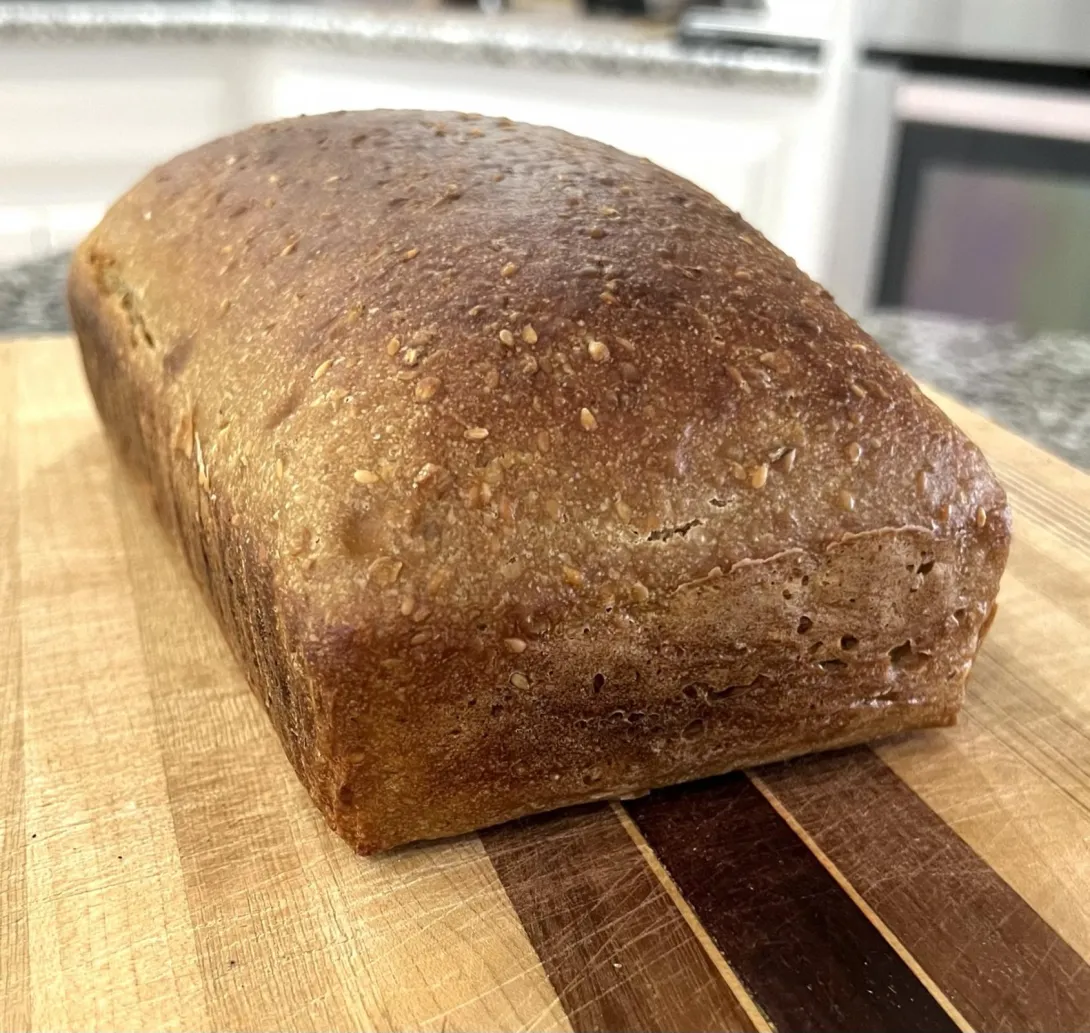
Earlier this year, Tony (CalBeachBaker) posted a bread made with einkorn flour. I modified the recipe a tad, and this is my second attempt (these bakes were my first experience with einkorn).
For the levain, I mixed 3 grams of sourdough starter, 72 grams of einkorn flour, and 54 grams of water. There is a soaker, and for that I mixed 48 grams of rye chops, 48 grams of sesame seeds, 120 grams of boiling water, and 2 grams of salt. The levain and soaker sat overnight covered at room temperature.
After about twelve hours, it was time to combine the final dough ingredients. These were 407 grams of einkorn, 329 grams of water, 8 grams of salt, and all of the levain and soaker. I mixed by hand using a small plastic scraper, and the components came together fairly easily. Three stretch-and-fold sessions spaced thirty minutes apart followed, and then the dough sat for a total bulk fermentation of two hours and ten minutes.
For those unfamiliar with einkorn, perhaps a word or two. If you think rye is sticky, you haven't worked with einkorn, which is super sticky. It also has no gluten strength, doesn't rise, and has no structure for shaping. If some of you with einkorn experience can chime in with some tips or comments, that would be very much appreciated.
After dumping the dough onto a floured countertop, I shaped (sort of) by using a scraper to flop the dough onto itself and let it sit for five minutes. Then I used the scraper and a bench knife to get underneath the mass of dough and plop it into a 9"x5" loaf pan that had been lined with parchment paper. I smoothed the top of the dough with a spatula, and the loaf pan went into a plastic bag. The proofing phase lasted about an hour and forty minutes, during which time I saw no rising to speak of, but the dough did settle nicely in the loaf pan.
Eventually I put the loaf pan into a 450F oven that has pie pans filled with lava rocks for steam, and the bake lasted forty-five minutes. Watching the loaf expand during the bake was neat.
Here is the loaf, and you can see where the dough rose from its level at the start of the bake until the end.
The crust is tender, and the crumb is chewy with a nice flavor.
Given the slightly gummy center evident at the very bottom of the loaf, I think the next time the bake will be perhaps five minutes longer, but everything else seemed to go well.
Einkorn is one of the ancient grains, and I wanted to give it a try. Glad I did, and there will be more bakes with it.
Happy baking.
Ted
- WatertownNewbie's Blog
- Log in or register to post comments
Nice looking loaves! So far I have not baked a loaf that had anywhere near 100% einkorn flour, but I have really liked the flavor of the ones I've tried. I have a bag from a local waterwheel mill, and now that I've read your post I'm even more interested in using it again
TomP
Thanks for your comments. I haven't tried einkorn blended with other flours, and it would be interesting to combine various gluten strengths and flavors. This one is a pretty simple bread to make.
Ted
Nice looking bake Ted.
I was inspired by your last effort that I baked the remainder of my einkorn grain. I second your comment on sticky dough. I'm finding the ancient grains are behaving as you described.
Tony
Nice to hear that you are pursuing the einkorn path too. Reducing the temperature and especially the water in the soaker made a difference from my first bake.
Ted
I commend your perseverance with einkorn. I also found that it was difficult to handle the dough, even in combination with whole wheat. And I found that the flavor of the whole wheat masked the flavor of the einkorn, so much so that I haven't pursued it further. But I will continue with all things rye.
Along with the perseverance I have some patience too. Einkorn is certainly a change from bread flour, and I look at this experience as a departure from the "get the feel of the dough" type of baking. Somewhere in the distant past there were people whose whole concept of bread was einkorn, and it is interesting to imagine working with this flour in primitive conditions (no loaf pan, no oven other than wood-fired, etc.).
Rye is a great flour too. Many of my favorite breads contain some portion of rye, and then there are the Borodinsky adventures. So many baking opportunities.
Thanks for your comment. Happy baking.